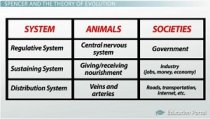
Spencer and the Theory of Evolution
The idea of something changing naturally isn't a new idea, but one that explained with his theory of evolution. Herbert Spencer, an English sociologist, took Darwin's theory and applied it to how societies change and evolve over time. As a sociologist, Spencer did not feel the need to correct or improve society, for he felt that societies were bound to change automatically.
Societies can be compared to organisms in that both have three main systemsSpencer took the theory of evolution one step beyond biology and applied it to say that societies were organisms that progress through changes similar to that of a living species. It was Spencer's philosophy that societies (like organisms) would begin simple and then progress to a more complex form. Spencer also found similarities between animal organisms and societies in that both had three main systems.
The first system is the regulative system. In animals, that would be the . In societies, it would be government that regulates everything. The second system is the sustaining system. For animals, that's the giving and receiving of nourishment. For societies, that would be industry - jobs, money, economy and those sorts of things. The third system would be the . In animals, that would be the veins and arteries. are exchanged.
are exchanged.
Survival of the Fittest
It was Herbert Spencer, not Darwin, who coined the phrase 'survival of the fittest' due to the fact that he believed human behavior was designed in a way that strives for self-preservation. Darwin later used the term 'survival of the fittest' in his edition of Origins of the Species.
The theory of social Darwinism created the thinking of the 'survival of the fittest' as that the strongest and the fittest should survive and flourish in society, and the weak should be allowed to die out. This allowed Spencer to believe that the rich and powerful became so because they were better-suited to the social and economic climate of the time. He believed it was natural or normal that the strong survived at the cost of the weak.
Spencer believed that it was natural for the strong to survive at the cost of the weakThe negative side of believing in social Darwinism is the false concept that if something naturally happens then it is alright or good that humans do it as well. On the extreme side, this thinking is part of what led to the rise of the practice of eugenics with the Nazi party in Germany or the American eugenics movement of 1910-1930. On the positive side, social Darwinism led to the creation of programs that allowed deserving participants to receive resources that would help them change their dire circumstances.
Structural-Functionalist Theorist
Spencer is one of the top three sociologists who influenced the thinking of the structural-functional perspective. This influence is placed right alongside those of Auguste Comte, the founder of sociology, and Emile Durkheim.










 Chauncey Wright (September 10, 1830 - September 12, 1875), American philosopher and mathematician, was born at Northampton, Massachusetts.
Chauncey Wright (September 10, 1830 - September 12, 1875), American philosopher and mathematician, was born at Northampton, Massachusetts. Lieutenant-General Augustus Henry Lane-Fox Pitt Rivers (14 April 1827 – 4 May 1900) was an English army officer, ethnologist, and archaeologist. He was noted for his innovations in archaeological methods, and in the museum display of archaeological and ethnological...
Lieutenant-General Augustus Henry Lane-Fox Pitt Rivers (14 April 1827 – 4 May 1900) was an English army officer, ethnologist, and archaeologist. He was noted for his innovations in archaeological methods, and in the museum display of archaeological and ethnological...